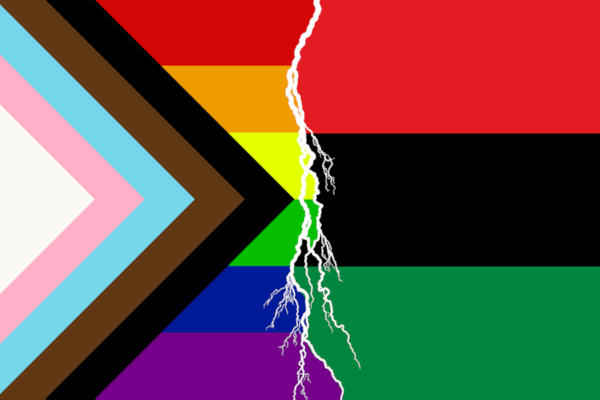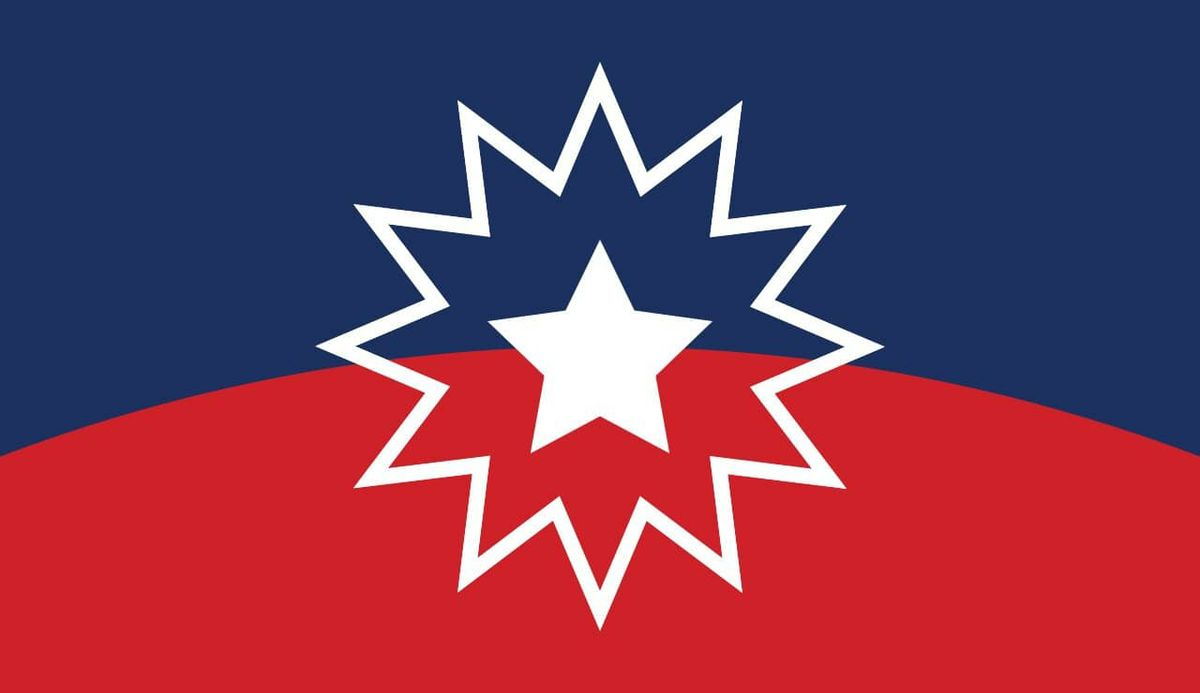My Problem with the LGBT Pride Progress Flag

June is lesbian, gay, bisexual, and transgender (LGBT) Pride Month. In this summer month, gays (many, obviously not all) flood the streets for pride parades wearing rainbow pride flags and boasting about gay unity. Then there's the LGBT "slacktivism," a fancy synonym for "virtue signaling," which basically means speaking about issues without actually doing anything to support a solution. For example, many companies overlay the rainbow pride flag over their logos on social media. How often do you hear about those same companies giving opportunities to gays and trans folks? I liken it to people with "#BLM" in their Twitter bio but nothing to show that they truly support or even understand Blacks' fight against racism. But my primary issue with gay pride month:
How native Black Americans care more about it (and gay pride in general) than Black history month and Black pride.
LGBTQIA+ Pride Progress Flag
The new gay pride flag, half shown in the featured image above, adds colored chevrons on the left of the most common "rainbow push" flag. I want to focus on the black and brown stripes which symbolize "people of color." To ensure we're on the same page, "people of color" includes Asians and Mexicans, basically meaning that "PoC" is everyone non-white. Back to the flag, the black and brown stripes precede the trans flag colors and are closest to the center.
Attack on Black Masculinity
I interpret this in two ways. First, feminine gay Blacks and specifically trans Blacks, seem to be the "face" of homosexuality in the US. Why? They're considered "defanged" men who no longer pose a threat to White supremacy. Mainstream media (MSM) pushes these effeminate figures to encourage Black males to adopt such characteristics which do not attract good women looking to become wives and mothers. As a result, less Blacks are born, at least to stable 2-parent households. This produces more Black youth who are less likely to be raised adequately at home and therefore end up in prison. This all results in less Black men protecting and providing for Black women, children, and communities, forcing them to depend more on the dominate White society.
No, I am not feminine, but many heterosexuals would argue that every gay man is "defanged."
Lil Nas X's "Old Town Road" broke the record for longest-running number 1 hit on the Billboard Hot 100. RuPaul is the "most decorated Black artist in Emmy Awards history." Yes, I believe that they broke those records because Whites want to encourage other Black men to suppress masculinity for slightly higher social acceptance. Do not mistake "higher social acceptance" as a synonym for "greater respect." Black gay and feminine men are simply assumed to be a lesser threat to the status quo. I talk more about this is in "Complex Layers of Racism."
What you just read was a short explanation of the so-called "replacement theory," a belief that Whites want to ensure that they remain dominate in population (at least in the United States). During talks of overturning Roe v. Wade in 2022 we often saw stats about who are getting abortions the most and why. Some show that White women get most abortions. Many like the most recent report I've found from Pew Research Center state that Black women get the most abortions. Regardless, the American birth dearth leads to many discussions about reproduction and population control with projects like Planned Parenthood and Margaret Sanger's Negro Project. Final note: Dr. T. Hasan Johnson discusses the madness of Black women aborting male babies, so I won't do so here.
I think that it's important to acknowledge that the prevalence of down-low (DL) gay Black women has become common knowledge in recent years, but Black women are generally the face of "diversity, equity, and inclusion" (DEI) in the workforce, a buffer phrase that should mean "combating anti-Black racism." Something to think about: a caller in Yvette Carnell's Claudine Gay video stated that he sees "DEI" as diversity is for "people of color," equity is for women, and inclusion is for LGBT. Dr. Tommy Curry explained in full detail how this aligns with the core component of anti-Black racism, anti-Black misandry.
Anti-Blackness
My second interpretation goes back to my core issue with the month of gayness. Many gay Blacks attempt to separate themselves from everything related to Black culture and how their skin color affects others' perception of them. They'll identify as gay, trans, or something else under the "LMNOP" umbrella (term accredited to Jaye De Black). They might have lesser known rainbow flags in their social media profiles. They'll likely talk way more about gay or "Black and gay" experiences than anything specific to Black culture. They might be against Reparations for Blacks and care nothing about supporting Black-owned businesses or historically Black colleges and universities (HBCUs). It goes back to social acceptance and resources allocated from social groups who reward you for shedding Black identity and not reminding non-Blacks that anti-Black racism is a huge issue and one unlike racism against any other ethnic group in the US.
In April 2023, I asked Twitter if trans people identify first as Black or trans, but nobody replied.
Question for Black transwomen: do you identify yourself first as "Black/ADOS/FBA" or "trans?" #LGBT #trans #gay #blacktranslivesmatter
— Jt (@jtspratley) April 12, 2023
However, I did find this video clip where trans comedian Flame Monroe states that it's safer for her to tell the police that she's trans than a Black man.
Pan-African Month
There are three pro-Black, Afro-centric events in June.
Juneteenth
Juneteenth honors when President Abraham Lincoln signed the "Emancipation Proclamation on September 22, 1862 which led to the freedom of Black slaves." It became a federal holiday on June 17, 2021 and is celebrated on June 19th. Below is an image of the Juneteenth flag.

Watch this video below for detailed information regarding Juneteenth history.
African-American Music Appreciation and Caribbean-American Heritage Month
Did you know that June is also African-American Music Appreciation Month and Caribbean-American Heritage Month? I didn't until I got curious about what else is nationally recognized in June. There's a decent primer for Black music history on the National Museum of African American History and Culture (NMAAHC) site. The American Descendants of Slavery (ADOS) Advocacy Foundation has a great article about challenges Black Americans still face in the music industry.
Caribbean Americans can view related events and local US chapters on the Caribbean American Month site. The official White House site shares proclamations for each that you can also read if you're interested. We should recognize these especially in June but also daily just like Black history in general.
#Juneteenth is over, but it's still have African-American Music Appreciation Month and Caribbean-American Heritage Month, #BlackTwitter #ADOS #FBA . Let's celebrate these just as we should #BlackHistoryMonth - everyday.
— Jt (@jtspratley) June 20, 2023
Tags: lgbt, black-community





